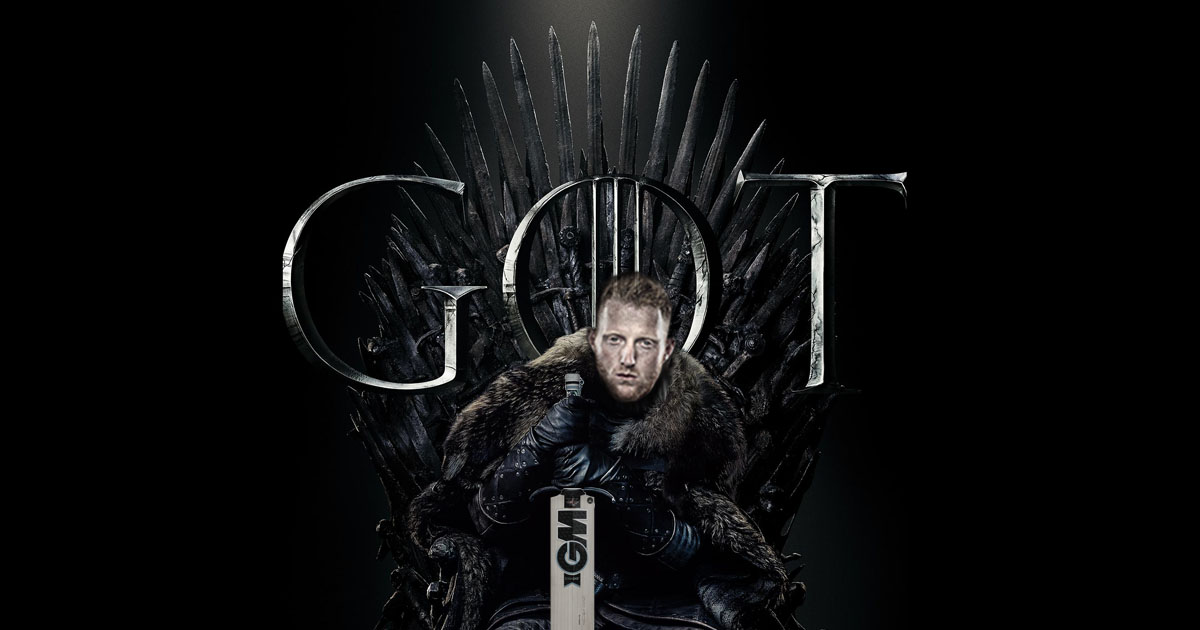Ben Stokes - The Prince that was promised

“The King in the North! The King in the North,” echoed the voices of the people in Leeds, celebrating their leader who had just defeated the enemy, for they knew there was no one else like him.
There once lived a boy, thousands of years ago, south of the wall, named Jon Snow. He wasn’t a Stark and was seen as an outcast - not by the people of his own kind, but by the outside world. “The Bastard of Winterfell” they called him but the Starks didn’t care. They raised him, protected him, celebrated him, and looked after him as one of their own. A Snow in a land full of Starks did seem odd, but then again, who can really define what makes someone a Stark?
A Kiwi in a land full of Englishmen did seem odd, but then again, who can define what really makes someone English?
In a parallel universe, a boy named Benjamin Andrew Stokes moved to the Northern Part of England when he was aged just 12. He lived, grew up, learned his trade, and the Northerners adopted him as one of their own. “The Bastard of Durham” they called him, the outsiders, pointing towards his Maori ancestry every second opportunity they got. A Kiwi in a land full of Englishmen did seem odd, but then again, who can define what really makes someone English?
By the time he grew up, Jon had decided to join the Night’s Watch. He saw the Watch as an honorable order, consisting of honorable men who took pride in the great responsibility of guarding the people of Westeros from whatever threat lay north of the Wall. But his uncle Benjen Stark, who was given the responsibility of taking Jon to the wall, warned him that it was no easy pushover. “The wall is a hard place for a boy, Jon”. “I am almost a man grown,” Jon protested, “I will turn 15 on my next name day, and Maester Luwin says bastards grow up faster than other children.” He was just a boy, but he’d decided to put away his family, friends and land for the greater good of his people.
Stokes, too, by the time he was 15, had decided to take up cricket. He saw the sport as an opportunity of incalculable value to put his talent to use and represent the country he’d adopted and vice-versa, taking great pride in serving a nation with a rich sporting heritage. Like Jon, he, too, had decided to leave behind his friends and family for a greater good - to bring glory, pride and joy for the people of his country.

 © Getty
© GettyIn the Night’s Watch, Jon rose up the ranks in no time, and went from “a bastard boy with a pretty face” to the most loyal and trusted “crow” of the then Lord Commander of the Night's Watch, Joer Mormont. Swordsmen like Jon were few and far between - let alone in the North itself, but in the whole of Westeros. Legend has it that Ser Arthur Dayne is the greatest swordsman to have ever lived, but for people who hadn’t seen him, it was Jon, at least among the men who were still alive.
Stokes catapulted in the ranks of English cricket, going from “A mag ginger-head with wee attitude problems” to the man all English captains - be it Eoin Morgan or Alastair Cook or Joe Root - turned to. As for Stokes, he belonged to the rare commodity of “fast-bowling all-rounders”, and was head and shoulders above any other all-rounder, not just in England, but in the whole world. While Sir Ian Botham and Jacques Kallis are considered to be the greatest all-rounders to have ever graced the game, in modern-day cricket, Stokes was widely considered to be the best all-rounder of his kind, and by some distance.
From House Lannister to Shane Warne, every great house, every great swordsman, every great player has had to once stare at the absolute nadir of life and endure humiliation before redeeming themselves to script their name in the history books. Sometimes life does not give you portents and lets you float in your own quixotic bubble before eventually bursting it when you least expect it.
The moment had arrived, it was time to face the truth, it was time to see if they really were the men they were perceived to be. For Jon, it was a cold morning at Hardhome against the living and the dead, against people who liked him and who didn’t, and men he knew and didn’t. For Stokes, it was a hot and humid night at Eden Gardens against players who he’d played with and against, in situations where he’d been before and hadn’t.
For both men, what ensued next was nothing short of horrific. While Jon witnessed the Wights and the White Walkers slaughter all the men and the women he did and didn’t know to pieces, Stokes saw a certain giant from the Caribbean - Carlos Brathwaite - tonk his deliveries all over the park. Both hung their heads in shame - one knowing that he’d failed to save the lives of his people, and the other, knowing that he’d shattered the hopes of millions back home. While the Night King turned Jon’s people against him, the English media did it for Stokes, and both men found themselves stranded on an island of sorrow.
For many, for most, this would have been the end of the road. But then again, these two aren’t just men, they’re much much more than that.
There is, of course, little justice in this world, or rather, justice is what people perceive the truth to be from their own eyes. Both men suffered the wrath of a world where hatred triumphs love and pride and politics triumphs humanity. Jon was betrayed and stabbed to death by his own brothers from the Night’s Watch for “siding with the Wildlings”, while the English Cricket Board suspended Stokes for his involvement in the Bristol night-club brawl in an attempt to “wipe the slate clean”. The latter decision saw Stokes miss the Ashes, but ironically enough, the court found him not guilty. But nevertheless, he was reprimanded by the ECB for “bringing the sport into disrepute”.
For many, for most, this would have been the end of the road. But then again, these two aren’t just men, they’re much much more than that. Each of them needed resurrection - for Jon, his life, and for Stokes, his career - to go on and achieve what they were meant to do. Jon was resurrected by a Red Priestess, while Stokes did it himself, maybe because of the fact he already had red hair. Anyway, back to business they went.
The term “Kill the boy, become a man” was perhaps taken a bit too literally by Jon Snow. Stokes, however, interpreted that in his own way, killing off his ego, and perhaps even forgiving some of his teammates for a comment or two made about him. By now, though, the Starks had lost Winterfell to the Boltons. There were statements whirring around the ears of Jon “You have to take the North back. You might not be a Stark but you’re one of our own and we need you to take it back.”
For Stokes, the assigned task was something equally difficult. For the inventors of the sport of cricket, it was a black mark on their history that they had failed to do enough to be termed as the champions of the world. With the battleground right back at home, the pressure was right on Stokes to win it back so that Lord’s could finally keep the trophy rather than hand it over to yet another team.

 The Hand of God? © Getty
The Hand of God? © GettyFor both men, these were just sub-plots in their ultimate path to greatness. To take back Winterfell, Jon had to battle a fellow bastard in the form of Ramsay Snow, while to deliver the World Cup, Stokes had to defeat his country of birth. Ironic, poetic, and beautiful in its own way. This time around, they had learned from the failures of the past, and emerged victorious - but not without obvious help. The Knights of the Vale bailed Jon out of a rather fatal situation, whereas for Stokes, it came in many forms - namely the ICC rulebook, the umpires and Trent Boult.
Winning back Winterfell was just something that needed to be done to sure up the defences against the “Real Enemy”. But it looked like it would not matter as the Night King made his way into the Godswood to put an end to the story altogether. It looked like all the effort, all the wins - upto that point - all the suffering, would account for nothing as the enemy would bring an end to the whole of Westeros.
Lord’s looked like a mirror image of the battle for Winterfell. The enemy was just too strong. Bundling 10 English wickets for just 67 runs in the first innings, they piled on more misery with a second innings battering to hand England a target of 359. And just as the Night King entered the Godswood in Winterfell, Pattinson got rid of Broad to bring all the dreadful memories of the past crashing into the minds of fans.
But this is where the similarities end.
Prophecies, theories and common sense suggested that Jon should and would end up killing the Night King to help the living win the battle against the dead. “The Long Night” beckoned, the stage was set and the other characters were merely extras. This was it, seven seasons and 69 episodes of buildup all so that we can witness one final showdown between The Night King and Jon. But what followed next shattered the hearts of millions - not because of the final outcome, but because of the sheer stupidity of how it was done, showing utter disdain to all the buildup. As Jon hid behind the wall trying to out-scream an injured Dragon, Arya Stark, out of nowhere, plunges from thin air and thrusts a dagger into the heart of the Night King. All the Wights and the Walkers perish, and along with them, the hopes of all the Game of Thrones fans and the character arc of Jon Snow, too.
The Ashes equivalent of it probably would have been Joe Denly taking 10 wickets in one innings to level the series for England, with the last wicket being a mankad, while Ben Stokes stood at fine leg signing autographs for young kids.

 © Getty
© Getty73 runs required with 1 wicket in hand, the stage was set, and all the other players were mere extras. As we headed into “The Long Night” at Headingley, one feared if it would have the same anti-climatic end as a certain fictional series. But The Ashes ain’t no Game of Thrones, and while Jon Snow hid behind walls unable to get to the enemy, Stokes stared right into the eyes of his, battled them, slaughtered them and helped his team get over the line. All the suffering, the hype and the cliffhangers of Stokes’ career was built up for this very moment, and he was all but destined for this. Sometimes, the most obvious scenarios can turn out to be the most beautiful yet powerful ones.
Headingley is the series finale that David Weiss and Dan Benioff were incapable of writing, and Ben Stokes gave us the perfect Jon Snow character arc that we never got to see. All hail “The King in the North” Ben Stokes, for he is the Prince that was promised.
Cricket FootBall Kabaddi
Basketball Hockey
SportsCafe
